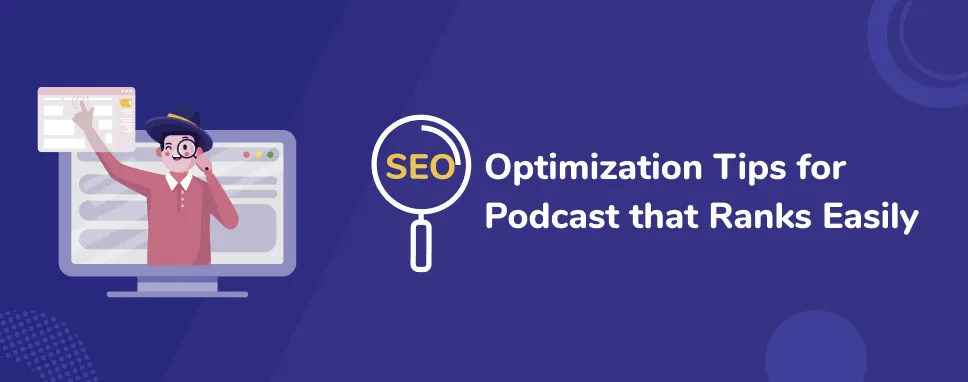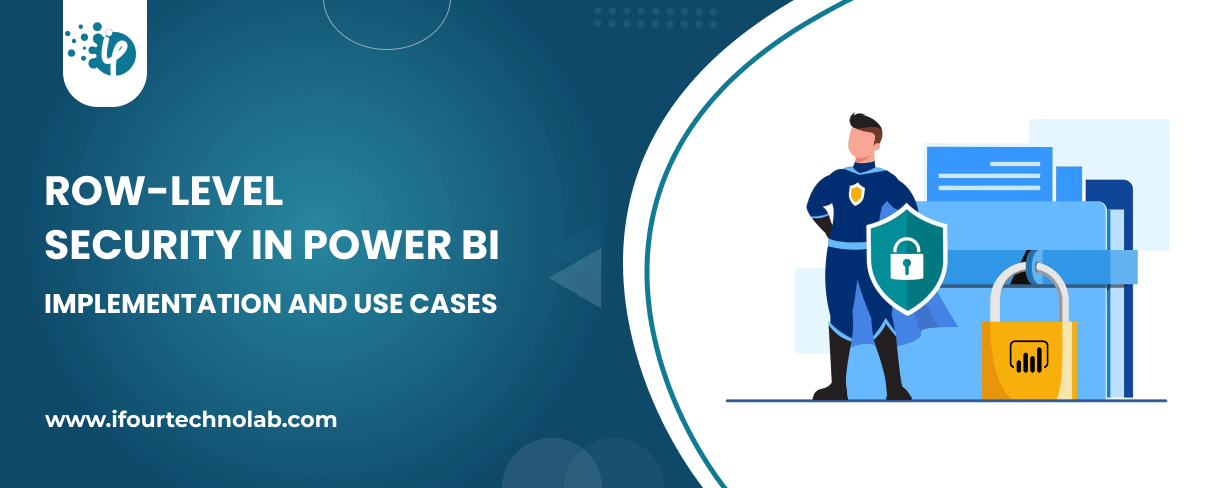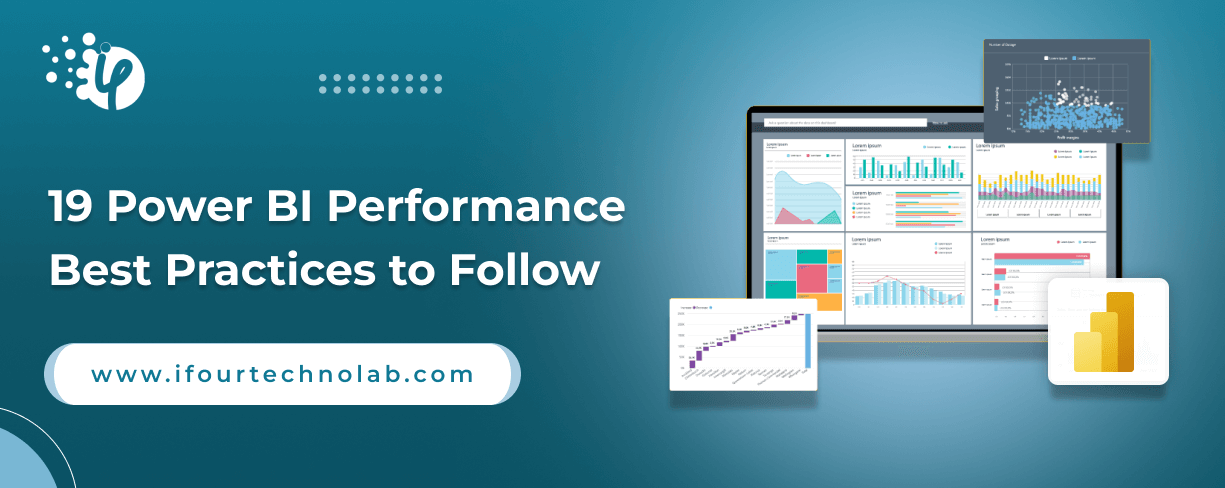Power BI Report Server: Key Features and Elements
Every CTO knows the struggle of managing complex reports. The inefficiency of scattered data, the constant juggling between reporting tools, the challenge of ensuring accurate KPIs...
Kapil Panchal - July 28, 2020
Listening is fun too.
Straighten your back and cherish with coffee - PLAY !

Podcast has become one of the ways of medium to explore and grow your targeted audience. Along with the popular traditional content strategies like creating blogs, images, videos, articles which are awesome ways of driving the traffic, now Podcast SEO has become a hype these days to build great traffic for the website, optimizing it for search engines. To reach your targeted audience, all you just need to know is how to leverage the Podcast for SEO to gain good rankings. Many outsource development companies that use Podcast for SEO and marketing makes sure that their descriptions using Podcast are clean, searchable, understandable with right keywords with engaging and interesting content to reach the market at a large extent.
“The most important thing about creating a podcast is finding a subject that is relevant and people will want to hear about. It is like creating a blog. If you write about something that doesn't have many searches on google and other search engines, it will probably not have a lot views.
However, it is important to look for topics that have not been explored in other podcasts yet. As there are 1 million blogs in the world, there are just around 700.000 podcasts, so a good strategy would be to choose topics from the top blogs on google, and use them in the podcast.”
- JAbner Moreira, From Home Office Formula“The audience is everything! For whom you are making marketing and SEO strategy, nothing will happen without them. So the best tip for podcasts is to know your audience who are they and what they want.
Who is your audience? How well do you know them already? If you don't know them well, you probably aren't ready to start a podcast just yet.
Where does your audience hang out? You'll need to be interacting with your audience every day. Do they hang out in a subreddit or at a particular forum? You should know the answer to this before you start and you should probably already be frequenting these "places" online.
Do you have a following/community already? It's a big plus if you have an email subscriber list of people who will be interested in your upcoming show. Or if you have a blog following, or if you have a product or service already built to serve your upcoming podcast audience.”
“Podcasting is one effective way of tapping new audiences for your brand. It is very important to have reputable guests on the show, taking into consideration their influence and proficiency in the related field that your brand is lined with.
To maximize the benefits of podcasting, I personally do weekly episodes wherein we invite seasoned experts in the Real Estate field or any related industries. This will give the audience a sense of credibility, therefore making them trust your podcast and encourage them to anticipate future episodes.
Here are a few SEO and Marketing efforts we do to maximize the podcast:
“For your podcast to be successful and to add value to your SEO and other marketing initiatives, it's important to choose the right podcast hosting solution. You need to choose a podcast host that allows you to add custom links to your website within the podcast sitemap XML, podcast description, and social media share links. There are many podcast hosting solutions out there and not all of them offer this.”
- Amir Shahzeidi, Digital Marketing Manager at Uscreen“One tip is that once the podcast is made, on your specific website you can create a page for that episode. This page can broadcast the podcast and can be a place where the listener can directly download it.
The page URL can contain the keyword inserted as an extension. The page itself should contain content related to the podcast, not the whole story but just the summary of 300- 400 words and most importantly it should contain the keyword enough times that it has a density of at least 1.5% but no more than 3%.”
- Azza Shahid, Outreach Consultant at Smith Thompson“When it comes to using podcasts for SEO and marketing, it’s not the name or the topic of your podcast that counts, it’s the title of your episodes that will get you found. Many podcasters think long and hard before settling on the perfect title for their podcast. But when it comes to their episode titles, they barely give them a second thought. Choosing the right episode title can make all the difference when it comes to SEO and marketing.
An episode with a generic title such as “Business podcast name - Episode 10” doesn’t mean anything to search engines, or to people who are unfamiliar with the show. However, an episode with a title such as “Five easy steps to achieve work-life balance while still earning a profit” will rank in the search engines and pique peoples’ curiosity.
Good episode titles, paired with well-written show notes, are a podcaster’s best option when it comes to SEO.”
- Mark Des Cotes, Founder at Podcast Branding“Every episode of your podcast must target one keyword. This keyword should appear in the title and meta description. Even if your episodes are similar, you must ensure you target separate keywords to avoid cannibalizing your success.
To increase your chances of ranking, you should assume your podcast keyword like a content keyword. Meaning you must target long-tail keyword with low competition and high search volume.”
- Folajomi Ballo, SEO Expert at Career in Blogging“You should first search for how your audience is searching for your targeted topic. Shortlist the potentially easy-to-rank keywords and especially put the focus on the question keywords. Afterward, craft your outline accordingly. Include the “points to be discussed” above your podcast. In this way, you would be supplementing search engines what your topic is about. Additionally, craft a quick summary of what the audience should expect in the podcasts. In this summary, you can add LSI and secondary keywords to enhance an on-page SEO score.”
- Werner Jorgensen, Sales & Marketing Manager at Heatxperts“Make sure you're adding your keyword in the podcast title. For example, if your Focus keyword is "Podcast SEO." You can use it in your podcast title to make your keyword SEO optimized. Google revealed earlier this year that the podcasts would continue to appear in the search results. The title of your podcast is your number one keyword. However, you're not only going to rank for it until you produce more episodes, so you want to make sure that you maximize your chances of growing your audience.”
- From Mountainise“When scripting a podcast and producing it, it's important to keep SEO in mind because your text for the podcast will correspond with this. Whatever is in your podcast description will help your audience gauge whether they want to listen or not. If the text includes SEO keywords, you'd better be discussing that as part of your podcast's main theme. For example, "the best Bluetooth speaker" would be discussed and written in the exact same wordage - to help people locate the podcast and also tune in and pay attention when they're listening.”
- Lillian, From The Wired Shopper“One way to use podcasts for SEO is to leverage your website. When it comes to SEO, you want people to consider your content as high-quality. If you use your website to show how other companies have shared your content, this can create that confirmation for new brands and writers. It could be all that’s needed to move your content from being a “maybe” to a “must have” in someone’s article. Remember that just because your podcast is an audio file, doesn’t mean you can’t use it to send more traffic to your website. After all, that is one of our main goals when it comes to creating content online.”
- Carla Diaz, Co-founder of Broadband Search“Podcasting is a relatively inexpensive way to gain a new audience. It is easy to start up and publish. When you link up with other podcasters, invite guests on, or use a hosting site such as PodBean you can quickly create a much larger audience for yourself which means gaining more traffic to your site. Additionally, people who listen to your podcast may be intrigued to visit your site, so it can be SEO beneficial in both directions.”
- Laura Fuentes, Operator of Infinity Dish“Every podcast platform and hosting service provides the content creator an area to provide the description of the show as an overall and of the episode treating each Episode as a Blog Article, using the correct Title, Description, Keywords, and adding URLs to your site and social media handle will add Value to your presence, website, and enrich your channels creating a Synergy between all channels. If your repurpose the content by dividing it into snippets, and sections, it will create a ripple effect throughout the search engines where it will propel the content to those searching for the same or similar terms/keywords as well as anything that relates to your current audience and guests, if any.”
- Mikel Martinez, Owner of Mikel Media“Transcribers are cheap and plentiful on platforms like Upwork. If you want your podcast to help your site’s SEO, send the audio file to a freelancer and have them write it up, so you can post the text beneath the show notes. You can then go in after the fact and add optimized headers and internal links to relevant pages on your site, and voila, with little extra work or expense, you’ve turned your podcast into an SEO asset.”
- Daniel Caughill, Co-Founder of The Dog Tale“As we begin to power through the 2020 decade, we will see audio continue to make great strides, and SEO is sure to catch up. However, until then, a very powerful tip to make sure you’re getting every single ounce of juice out of your podcast is making sure you’re getting every podcast episode TRANSCRIBED and embedded on your website. Until SEO catches up with audio, the name of the SEO game will continue to be “text,” so by doing something as simple as adding the audio transcript to your website, Google will pick up all the keywords it otherwise wouldn’t have identified and help you rank for them.”
- Manuela Carvajal“I always recommend a podcast transcription. Whenever you publish a blogpost with the podcast link, make a transcription of it. It is always a powerful SEO blogpost with your keywords included in each paragraph. Usually podcasts last a minimum of 20 minutes, which when transcribed makes a really long blogpost - also valuable for SEO purposes.”
- Anna Buczak, Content Marketing Manager at Ulam Labs“Run the audio of the podcast through Otter, having someone edit it (perfect for interns). Then add the transcript to the end of the podcast post on your website to create very google friendly long-form SEO content. It may not be keyword rich (although you can always tweak the copy) but it will show Google that you’re constantly adding new conversational content to your site.”
- Mike Oh, the President of TSP LLC.“Using a podcast for SEO is a great way to create unique content for your website and blog. After each show, I recommend planning out several blog posts based on your latest episode. To help with that, start by breaking your podcast into smaller 1 to 2-minute clips that can be used to create the new blog posts. Write your blog post around that clip/topic, embed the audio file, and use it to promote your podcast. Those audio clips are great pieces to use in social media as well!”
- Tom Brodbeck, SEO Associate Manager of Found Search Marketing“My top tip for using your podcast to increase your search engine optimization is to take your podcast transcripts and "bloggify" them. Clean up the transcripts so they follow SEO best practices for content instead of just posting the raw transcript. If your podcast episodes are long, then break up the transcript based on topics into multiple blog posts.”
- Ruthie Bowles, Owner of Defy The Status Quo“Add a table of contents to not only help your audience find the smaller chunk of content they’re interested in but also to incorporate the keywords that Google will find.
After recording a podcast, separate it into chapters. A good podcast will be structured, and so will lend itself to chapters breaks. Each chapter should be keyword titled. Don’t miss this opportunity as it is one of the major ways that Google will “know” what your podcast is about and will match it to your audience’s search.”
- Melanie Musson, an SEO expert and Writer for Car Insurance Comparison“If you want to benefit from podcasts for SEO, you want to make sure that you can get a relevant backlink every time that you’re on a podcast. This is why it’s crucial to ask the host to link to your website and personal profiles. Also, you can ask to include specific links and anchors that you need - if the host wants to cooperate. Another tip is not to accept just any podcast appearance. Choose websites with a domain authority (DA) which is higher than your own. For example, if your own website DA is 20, go after podcasts that have a higher DA if you really want to benefit from the backlink and the podcast.”
- Petra Odak, CMO at Better Proposals“Submit your podcast RSS Feed to a number of podcast hosting or submission sites for backlinks. You can write a description and make sure the topic keywords of the podcast are linked to an important page on your website. You can also add them to your Youtube channel or your website to gain valuable and meaningful traffic.”
- Nalini Prasad, Chief Strategy Officer at BluShark Digital“Generally, sponsoring podcasts is much cheaper than blog content, YouTube content, and social media content, and you get a wide range of niches. Perhaps even more than in other forms of media. Nowadays there are podcasts in every niche you can imagine, so it’s not at all difficult to find a podcast with a decent reach that will give you some exposure to their desirable audience. Less people tend to skip ads in podcasts compared to YouTube, for example, so that means that more people are actively engaging with your messaging.”
- Nelson Sherwin, Manager of PEO Companies“When many people upload a full length podcast to their website or blog it can often be the one and only time that it is posted anywhere. However, many podcasts are filled which rich and interesting material that form micro moments in the podcast, this may be part of a debate, a tactic, a story, a fact or many other insights that a podcast may contain. The missing trick is to reuse those small moments from the podcast on other blog posts and pages in the future. So take that valuable 2 minute moment where it is relevant and repurpose it in a separate article. Not only does this tactic mean that your podcast has provided marketing material for more than one post, it also helps add interest and value into other articles.”
- Zak Jacobs, Director of RAD SEO“Like blogging, podcasting is about consistency. Consistency is good for your audience and even better for search engines who like to see the regular postings and links from your episodes. Most importantly, if you're doing podcasting with the intent to have an SEO benefit and you're not 1) adding backlinks to each episode and 2) syndicating your episodes to other podcasting channels, you're missing 90%+ of the benefit of podcasting for SEO!”
- Nate Nead, Principal of SEO.co
Every CTO knows the struggle of managing complex reports. The inefficiency of scattered data, the constant juggling between reporting tools, the challenge of ensuring accurate KPIs...

The very first reason why you should implement Row Level Security is to foster trust, a crucial element for any business's success. Next, it reduces data clutter and helps you load...

The performance of Power BI is significantly influenced by two essential factors: design consistency and the rapid loading of BI elements. This holds true whether you choose Tableau...